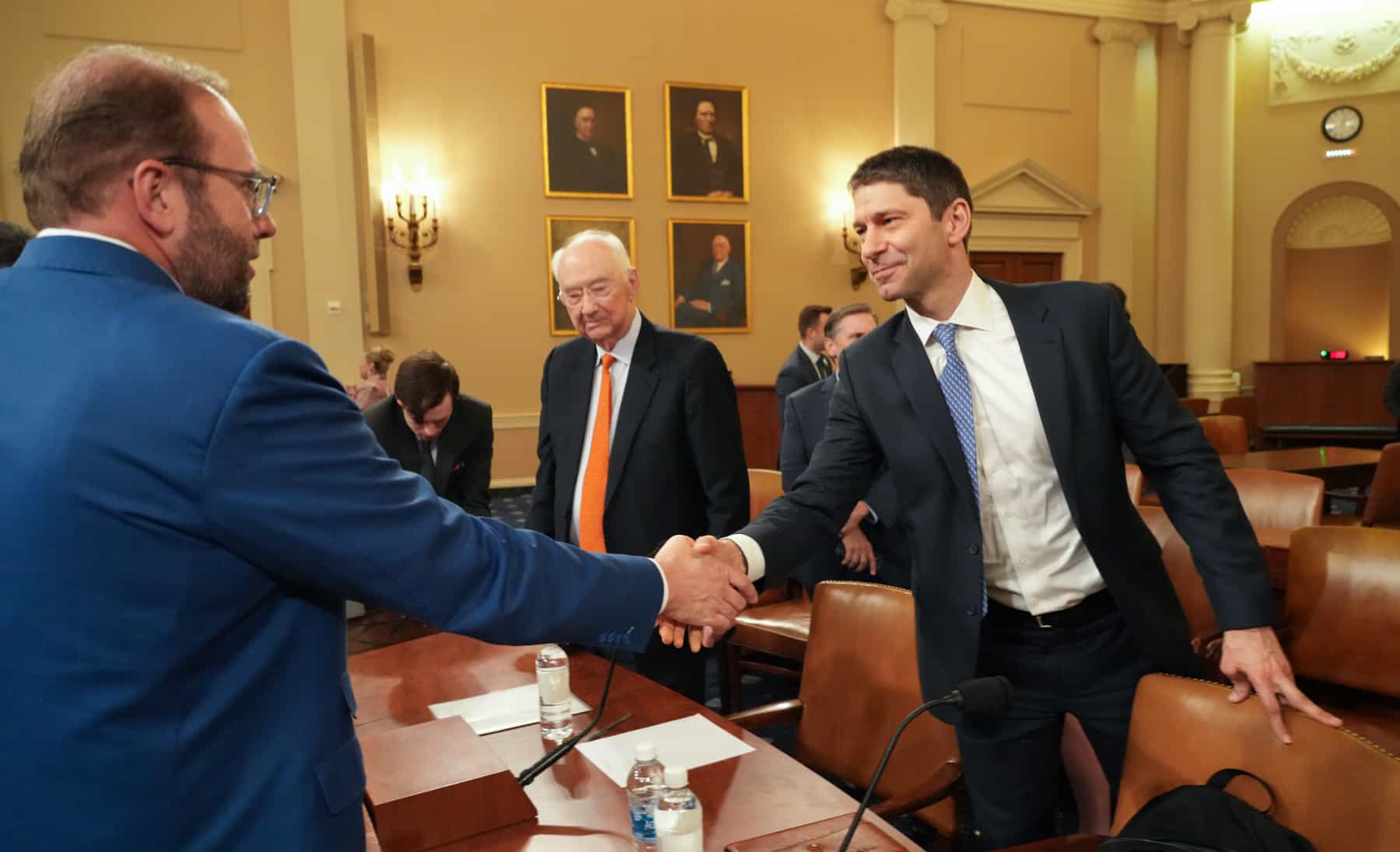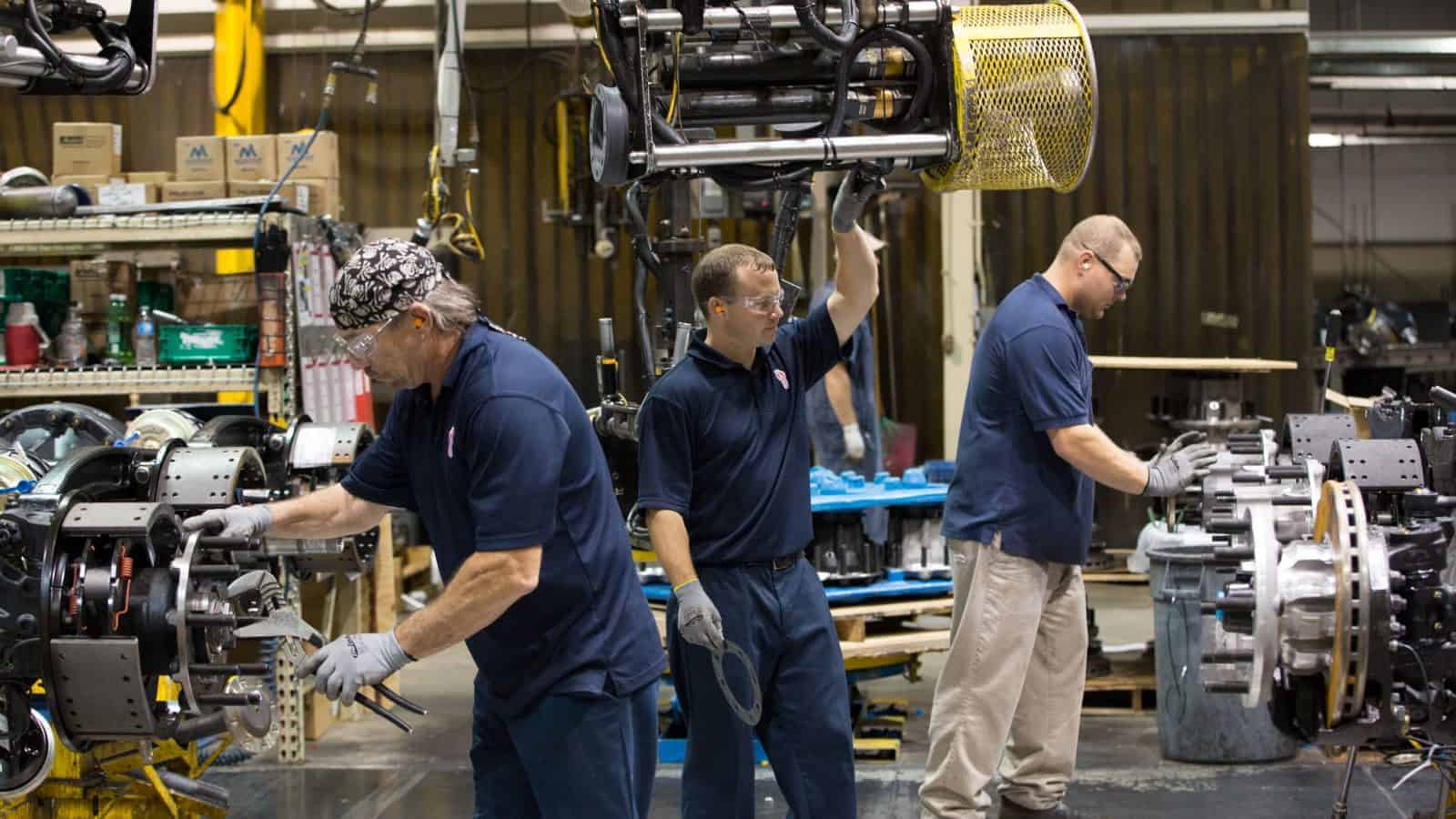Noncompete Ban Would Disrupt Manufacturing in the U.S.

The Federal Trade Commission’s vote this week to prohibit noncompete agreements between employers and their employees threatens manufacturing in the U.S., the NAM said Tuesday.
What’s going on: In a 3–2 vote Tuesday, commissioners finalized a rule that, like a draft version circulated last year, “would deem practically any noncompete clauses for paid staff, independent contractors and unpaid workers to be an unfair method of competition rendered unenforceable, and [would require] employers to tell current and former employees they’ve stopped enforcing them” (Law360, subscription).
- The final rule is set to go into effect 120 days after it is published in the Federal Register, but lawsuits have been filed against it already, and additional legal action is expected.
What’s changed: One change made to the final rule following the receipt of more than 26,000 comments on it allows existing noncompete agreements with senior-level executives to remain in effect.
- Another difference between the rule’s prior iteration and the final is to the ban’s sole exception. The draft “permitted noncompetes for individuals selling their business or a substantial stake of at least 25%.” That threshold is not in the final version.
Why it’s problematic: The rule “is unprecedented and threatens manufacturers’ ability to attract and retain talent,” said NAM Managing Vice President of Policy Chris Netram.
- “In addition, [it] puts at risk the security of intellectual property and trade secrets—anathema to an industry that accounts for 53% of all private-sector R&D.”
- A noncompete ban would disrupt the majority of U.S. manufacturing operations, a 2023 NAM survey found.
What’s next: The NAM is considering all options in response to the final rule and is in active discussion with congressional leadership and the relevant committees of jurisdiction.
New Overtime Rule Will Cost Employers and Workers

A new final overtime rule from the U.S. Department of Labor will reduce flexibility for employees and could force manufacturers to make difficult choices about their workforces, the NAM said Tuesday.
What’s going on: The new regulation “changes the salary threshold used to determine whether a worker is exempt from overtime pay” so that, beginning Jan. 1, 2025, most employees earning less than $58,656 will be owed time-and-a-half wages for hours worked over 40 in a single workweek (Bloomberg Law, subscription).
- The current salary threshold is $35,568.
- The new rule will go into effect July 1, following publication in the Federal Register.
Why it’s problematic: The change promises to present significant challenges to employers and employees alike.
- “Quarter after quarter, manufacturers cite workforce issues, such as attracting and retaining skilled employees, as their biggest business challenge,” said NAM Managing Vice President of Policy Chris Netram. The “rule places new constraints on employers, reduces flexibility for the workers who will be reclassified and may force companies to make painful choices that limit both job creation and growth opportunities available to employees.”
What’s next: The NAM is weighing all actions to protect manufacturers across the country.
Manufacturers: Noncompete Decision Threatens Manufacturers’ Ability to Protect IP
Washington, D.C. – Following the Federal Trade Commission’s vote in favor of a rule that would prohibit employers and their employees from entering noncompete agreements, National Association of Manufacturers Managing Vice President of Policy Chris Netram released the following statement:
“The FTC’s rule banning noncompete agreements is unprecedented and threatens manufacturers’ ability to attract and retain talent. In addition, today’s action puts at risk the security of intellectual property and trade secrets—anathema to an industry that accounts for 53% of all private-sector R&D.
“An NAM survey found that 66% of respondents—manufacturers of all sizes—said the ban would interfere with their operations, and nearly half said it would impact employee training programs. The ban could force manufacturers to revamp their human capital operations completely, enact burdensome controls or silo parts of their operations from each other, which would result in less training for employees, less collaboration, less innovation and less efficiency. The NAM will weigh all options in response to the commission’s vote, so that well-paying manufacturing jobs and innovation are not compromised.”
-NAM-
The National Association of Manufacturers is the largest manufacturing association in the United States, representing small and large manufacturers in every industrial sector and in all 50 states. Manufacturing employs nearly 13 million men and women, contributes $2.89 trillion to the U.S. economy annually and accounts for 53% of private-sector research and development. The NAM is the powerful voice of the manufacturing community and the leading advocate for a policy agenda that helps manufacturers compete in the global economy and create jobs across the United States. For more information about the NAM or to follow us on Twitter and Facebook, please visit www.nam.org.
Manufacturers: DOL Overtime Rule Will Exacerbate Workforce Crisis
Washington, D.C. – Following the release of the Department of Labor’s Wage and Hour Division rule concerning updates to the overtime regulations, National Association of Manufacturers Managing Vice President of Policy Chris Netram released the following statement:
“Quarter after quarter, manufacturers cite workforce issues, such as attracting and retaining skilled employees, as their biggest business challenge. Yet today’s rule places new constraints on employers, reduces flexibility for the workers who will be reclassified and may force companies to make painful choices that limit both job creation and growth opportunities available to employees. In addition, this latest regulatory hurdle will complicate manufacturers’ efforts to fill the millions of jobs our industry is projected to create within a decade.”
-NAM-
The National Association of Manufacturers is the largest manufacturing association in the United States, representing small and large manufacturers in every industrial sector and in all 50 states. Manufacturing employs nearly 13 million men and women, contributes $2.89 trillion to the U.S. economy annually and accounts for 53% of private-sector research and development. The NAM is the powerful voice of the manufacturing community and the leading advocate for a policy agenda that helps manufacturers compete in the global economy and create jobs across the United States. For more information about the NAM or to follow us on Twitter and Facebook, please visit www.nam.org.
Manufacturers: Unprecedented Use of CERCLA Authority Will Hamper President’s Manufacturing Vision
Washington, D.C. – Following the release of the Environmental Protection Agency’s rule designating perfluorooctane sulfonic acid, also known as PFOS, and perfluorooctanoic acid, also known as PFOA, as hazardous substances under the Comprehensive Environmental Response, Compensation and Liability Act, National Association of Manufacturers Managing Vice President of Policy Chris Netram released the following statement:
“Manufacturers support efforts to mitigate harmful chemicals from impacting our environment and the health of our nation, but this unprecedented use of CERCLA authority by the EPA will only hamper President Biden’s vision of growing the manufacturing sector in the U.S. The unique and unmatched chemical bond of these compounds means that there are no existing replacements for the critical products they make up.
“The NAM is not opposed to commonsense regulations of PFAS chemicals, and manufacturers are committed to environmental stewardship, while recognizing in many cases we will need to continue to use these chemicals for the foreseeable future. However, designating these compounds as hazardous substances is a blunt, overreaching decision that will make it harder for our industry to create innovative products and jobs.”
-NAM-
The National Association of Manufacturers is the largest manufacturing association in the United States, representing small and large manufacturers in every industrial sector and in all 50 states. Manufacturing employs nearly 13 million men and women, contributes $2.89 trillion to the U.S. economy annually and accounts for 53% of private-sector research and development. The NAM is the powerful voice of the manufacturing community and the leading advocate for a policy agenda that helps manufacturers compete in the global economy and create jobs across the United States. For more information about the NAM or to follow us on Twitter and Facebook, please visit www.nam.org.
Manufacturers Face Significant Cost Increases if Tax Bill Fails

U.S. manufacturers and other businesses are sharing the details of the potential economic fallout if Congress fails to pass NAM-supported, pro-growth tax legislation, The Wall Street Journal (subscription) reports.
What’s going on: “[L]arge public companies say the law as it stands is costing them hundreds of millions or billions of dollars, while some owners of small and medium-sized businesses say they wonder if their firms will survive.”
- The Tax Cuts and Jobs Act of 2017 allowed manufacturers across the U.S. to expand their businesses, hire and purchase new, much-needed equipment. But in 2022 and 2023, three critical provisions from the law—immediate expensing for domestic research and development, enhanced interest deductibility and full expensing—expired, hurting businesses of all sizes.
- In January, the House passed the Tax Relief for American Families and Workers Act, which would reinstate all three measures. The NAM has been pushing the Senate to pass the legislation, too.
Why it’s important: Lift truck and solutions manufacturer Hyster-Yale Materials Handling Inc. “spends around $100 million a year on R&D, and the law change that went into effect in 2022 increased its tax bill by about $25 million a year.”
- “So that’s $25 million less that I have to invest back into my business, whether it’s R&D, whether it’s plants and equipment [or] hiring new people,” Chief Financial Officer Scott Minder told the Journal.
- Other companies say the lack of action on the House-cleared tax bill “may prompt reduced investment in other areas and increase the rate of return required for new projects.”
Weighing a move: Hyster-Yale—which “spends around 80% of its research budget in the U.S.”—would like to keep its operations in the U.S., Minder continued, but it can’t guarantee that it will continue to do so without the return of the expired TCJA tax provisions.
- Other manufacturers are reporting a similar predicament.
The last word: “The stakes are clear: Congress must pass the Tax Relief for American Families and Workers Act or risk significant economic damage across the manufacturing sector,” said NAM Vice President of Domestic Policy Charles Crain.
- “Manufacturers are depending on Congress to restore these pro-growth tax policies, which support the investments in R&D and capital equipment that are so critical for manufacturing growth.”
U.S. Industrial Production Rises

U.S. industrial production increased modestly in March, in keeping with economist forecasts, according to baha.
What’s going on: “Industrial production in the United States rose by 0.4% in March after increasing 0.1% in the previous month, the Federal Reserve’s Board of Governors stated in its report published on Tuesday.”
The details: Manufacturing output increased 0.5% on a monthly basis and 0.8% on an annual basis. It rose 1.2% in February.
- Mining declined 1.4% in March and 2.0% year on year.
- The utilities index grew 2.0% for the month but declined 3.1% year on year.
Capacity utilization: Capacity utilization—a measure of potential output—for the industrial sector as a whole increased to 78.4%, up from 78.2% in February but “1.2 percentage points below its long-run average.”
What it means: These data are among “signs that manufacturing is starting to pick up,” MarketWatch (subscription) reports.
- “The S&P Global U.S. Manufacturing PMI has been in expansion territory for the past three months, and the ISM factory index was 50.3 in March, the first reading above the break-even level of 50 since September 2022.”
Manufacturer to Congress: Support the American Dream

Austin Ramirez is living proof that the American dream still works—when the right policies are in place.
The president and CEO of family-owned Husco, a Waukesha, Wisconsin-based, hydraulic and electromechanical control systems manufacturer, told lawmakers Thursday that his family was able to found and expand a successful business in large part thanks to pro-growth tax policies.
All in the family: “My dad came to the states from Puerto Rico as a 6-year-old and grew up to earn a master’s in aerospace engineering and a Harvard M.B.A.,” Ramirez said at a hearing of the House Ways and Means Committee.
- “In short, our story is the embodiment of the American dream. But it was made possible by American reality—the laws that all of you write in this very room have a direct, concrete impact on our ability to succeed.”
Impact of expirations: The 2017 Tax Cuts and Jobs Act made it possible for manufacturers across the country to invest in new equipment, pay for renovations and expansions, hire much-needed workers and more. It was “unquestionably a success,” according to Ramirez.
- But the 2022 and 2023 expiration of three manufacturing-critical tax provisions in the legislation—immediate expensing for domestic research and development, enhanced interest deductibility and full expensing, which the NAM has been urging legislators to reinstate—has already hit Ramirez’s business, and hard.
- “Husco now has to amortize our R&D expenses, making it far more costly for us to design customized, proprietary products for our customers,” Ramirez went on. “Debt financing is now more expensive … [a]nd we can no longer immediately expense the full cost of our capital equipment purchases, forcing [us] to make smaller investments, spread out over many years.”
More tax increases coming: Ramirez also highlighted the TCJA provisions that are set to expire next year and the economic damage the expiration would cause.
- “At the end of 2025, individual tax rates will increase and individual tax brackets will decrease,” he said. “These changes mean that pass-through businesses like Husco will have more of our income subject to a higher rate of tax. At the same time, the pass-through deduction will expire completely, doubling down on the tax hikes that we face. … [A]llowing tax reform to sunset will undermine much of the progress we’ve made since 2017.”
What must happen: Ramirez thanked the committee for passing the Tax Relief for American Families and Workers Act—and reminded them of work still to be done.
- “Congress must act now to restore expired provisions—and be prepared to act in 2025 to forestall even more damaging tax increases. Only by preserving the Tax Cuts and Jobs Act can Congress ensure that uniquely America stories like Husco remain possible.”
Senate Approves NLRB “Joint Employer” Repeal Proposal

The Senate this week approved a resolution to repeal the National Labor Relations Board joint employer rule, Reuters (subscription) reports.
What’s going on: In a 50–48 vote Wednesday, the Democrat-controlled Senate passed a Congressional Review Act resolution to block an NLRB “rule that would treat companies as the employers of many of their contract and franchise workers and require them to bargain with those workers’ unions.”
- President Biden pledged to veto the resolution, which the House approved in January. A veto would send the measure back to Congress, where it appears to lack the necessary votes for an override.
- The CRA “allows Congress to repeal agency rules through a majority vote in both houses.” The president must sign the resolution for it to take effect.
- The rule was scheduled to go into effect in February but was blocked by a federal judge in Texas. The NLRB is considering options in response to the decision.
What it would do: “The rule would treat companies as ‘joint employers’ of contract and franchise workers when they have control over key working conditions such as pay, scheduling, discipline and supervision, even if that control is indirect or not exercised.”
Why it would be problematic: The NLRB requirement would lead to confusion about which businesses should be considered employers, “disrupting franchising and routine contracting arrangements,” according to another Reuters article.
The NAM says: The joint employer rule would “harm manufacturers at a time when they need the flexibility and contingency offered through temporary and contract workers to best manage supply chain impacts, demand for manufactured products and other inflationary challenges,” the NAM told the NLRB in December.
Producer Prices Increase Less Than Expected

Prices paid by businesses to goods and services producers in the U.S. rose by slightly less than anticipated in March, according to Investing.com.
What’s going on: “The producer price index for final demand rose 0.2% last month, after rising by 0.6% in February, the Labor Department’s Bureau of Labor Statistics said. Economists had expected the PPI to gain 0.3%. In the 12 months through January, the PPI increased 2.1%, below the 2.2% expected, after climbing 1.6% in February.”
- “Core” PPI, which excludes food and energy prices, rose 0.2% on the month, for an annual increase of 2.4%.
- The data comes just a day after the release of a higher-than-anticipated consumer price index for last month.
The details: Services inflation stayed elevated, with a gain of 0.3% in prices in March, Barron’s reports.
- Goods prices, however, edged down 0.1%.
- A 1.6% decline in energy prices made up much of March’s overall decrease and outweighed a 0.8% increase in food prices.
Why it’s important: The news may mean an interest-rate cut from the Federal Reserve will come later than previously thought.
